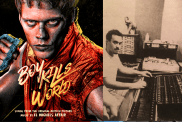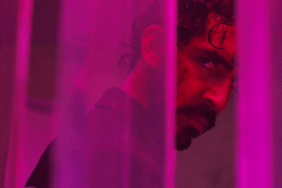If you’re a true movie buff, there’s really nothing better than watching some movie and a familiar face shows up you weren’t expecting and ends up stealing the scene from stars making the big bucks. Such is the gift (and the bane) of the character actor, and Giovanni Ribisi is a special instance since he’s one of those satellite actors who shows up from time to time in a movie without ever having played the exact same character twice.
At 37 years old, Ribisi has been acting since he was 11 years old, mostly in movies (and big Oscar-nominated films like Saving Private Ryan and Lost in Translation, too) but also making appearances on hit shows like “Friends” and “My Name Is Earl.” He’s taken a bit of time off as an actor since appearing in James Cameron’s Avatar a couple of years ago, but Ribisi is back co-starring in Contraband, a movie co-produced by and starring Mark Wahlberg as Chris Farraday, a former smuggler who has turned his back on that life to settle down with his wife (Kate Beckinsale) and their two kids. Things change when Ribisi’s character, a slimy criminal named Briggs threatens Wahlberg’s younger brother-in-law after a botched smuggling operation, forcing Chris to put together a crew for one last operation down in Panama.
It’s another character Ribisi’s fans should enjoy, as playing Briggs allows the actor to chew up a lot of scenery, but he also has a lot of scenes where he gets his ass whooped by Wahlberg’s character.
We actually spent some time earlier at a press conference with Ribisi so we didn’t necessarily have a lot more to ask about Contraband once we got him alone. Before we get to our first question, we asked Giovanni’s co-star Ben Foster about working with Ribisi during an earlier press conference, feeling that they’ve both taken similar approaches to their craft, and we got a surprisingly candid response from Foster that was much more intriguing than the usual “He was fun to work with” responses we normally get:
“I was living in Iowa before moving to Hollywood’ (he says this last word with edginess that makes us think Foster’s happier living in New York) but long story short, I saw an X-Files’ episode and I saw this young man, not much older than myself doing something I thought I’d never seen, something that really excited me. I waited for the credits and there was this name that I had no idea how to pronounce – I was maybe like 13 or 14 at the time, somewhere around there. I looked up in the TV Guide when it was playing again and watched it again and got his name and wrote the name down. Giovanni Ribisi.’ That’s an actor! I’d been doing mostly comedy–school plays, things like that–and then when I got to Los Angeles, it was such a kick to meet him, and we started running in similar groups that I was running in. I looked up to him, in a sense that he takes so many chances, he’s an electric performer and he’s somebody that I was grateful to get to know a little bit socially. So having the opportunity to play with him here on Contraband’ was a real kick.”
Hearing that, we knew what our first question to Ribisi would have to be.
ComingSoon.net: During the press conference earlier, I asked Ben Foster about working with you, since I thought you both have had similar styles of working and career choices. He told this whole story about seeing you on “The X-Files” when he was a teen, so did you have any idea that Ben Foster was a fan of yours?
Giovanni Ribisi: No, I think we talked about certain things, and in the beginning, it was a really great thing to be able to work with him. I have a lot of respect for him and I remember meeting him, it must have been fifteen years ago through some mutual friends, and he lived in Hollywood. I think he lives here now, but I think he’s somebody who is committed to what he does and I respect that a lot. I have a lot of respect for people who can be around for that long and still find something to care about, and not take it for granted.
CS: People might say that about you, too. When you get into a role, it’s not something you do by halves; you really get into it. You change your looks, change your voice. It’s not like you’re just collecting a paycheck and for this role, you really went for it.
Ribisi: Yeah, I think in anything, you have to keep asking yourself, “What is possible?” and I hope that doesn’t sound pretentious or anything, but you have to dive in, and I think why not? It’s an expression, and it’s not like showing off or anything, but part of trying to engage an audience, and in this day of internet and YouTube and social networking and all that stuff, which I think in a way is becoming the new artistic movement, oddly enough, I still think for me it’s still something that’s engaging. A performance, something that captures people. No matter what. The Greeks were around doing it thousands of years ago.

CS: What was the draw for you to do this movie? Was it working with Mark or was it the premise? What was it about this character that jumped out at you as something to do?
Ribisi: I would say it definitely starts with the character and something that was like, “I can’t do this, this is not me. I’m miscast. Are they serious?” So then I went in and I spoke to the director and they wanted me to audition, and I went in there and I said “No, I’m not going to audition for this. It’s impossible. For somebody to do a good job
I mean, what do you want me to do? Do you want me to come in there and do an accent and yell and stuff like that and see what it’s like? No. You have to trust me as I’m entrusting you and to really dive in and know that it’s a process and there are several months away and I’m going to be working on it.” And he (Balthazar) did, and I’m grateful for that, because I think we had a really good working relationship together.
CS: I’m always fascinated when I talk to actors like you who say they have to audition. I spoke with Judy Greer who is so great in everything
Ribisi: She’s so great.
CS: And really the same with you, because you’ve done so many movies that you must feel like you can go, “I’ve done so much stuff already. You have to trust I can do this.”
Ribisi: Yeah, and I do say that. Ultimately, I feel like the best representation of what you’re going to get in your own movie is going to be something you might look at that I’ve done in a professional setting. I guess I can see how that might be, and I think that it’s more or less a negotiation tactic, more than anything, but I don’t care.
CS: You spoke about your process downstairs and how you watched prison documentaries. I assume it must take a long time to develop these characters so does that mean you have to turn down other things to prepare?
Ribisi: It does. I don’t know. It can. I’ve done movies where I’ve been called on things and been like, “Oh, okay, I guess I’m going to work tomorrow? Really? Wow” and jump in, and some of those I’ve regretted being involved in, because I really feel like I didn’t take the steps or wasn’t able to take the steps or needed more time. Also, if I could, it would be interesting if it was worth it and something I really cared about on that level, I would spend a year working on something, and I think now my interest lies really more in finally getting around to making my own things and being at the helm. Sort of more or less cinema verité or documentary style of things, so yeah, that aspect of it. I think it’s important for every actor to do that, just to understand the director’s perspective, especially argumentative actors. (laughs)
CS: So this is something you’ve been gearing up to do for a while?
Ribisi: Yeah, absolutely, and I just wasn’t ready but now, it’s time to jump in.
CS: You should talk to Ben ’cause he’s producing movies now.
Ribisi: Oh, is he really? Oh, good.
CS: I saw that you were doing another movie with Mark Wahlberg (Seth McFarlane’s “Ted”), and I’m not sure what the timeframe was between that one and this one.
Ribisi: I think they were back-to-back.
CS: So when you showed up on that set, did you say “Do I get to beat you up this time?” ’cause he beats you up pretty badly in this one, dragging you out of your car
do you get your comeuppance in that one?
Ribisi: Yeah, I get beat up a lot in “Contraband,” and “Ted,” there’s a couple moments but for the most part, no, I’m still the bad guy to his good guy, you know? Oh, I don’t know if I’m the bad guy, but I’m the obsessed stalker guy, and I dunno, it’s hard to even talk about them in the same conversation, because they’re totally different, they’re just completely different films. “Ted” was Seth McFarlane’s directorial debut.
CS: I know. I was really excited to see how he works with live actors.
Ribisi: It’s going to be amazing. I think it’s going to be really good.

CS: One of the interesting things is that you have played a lot of villains so is it key to you to try to find something completely different and change things up? You obviously don’t want to get typecast as a villain and get different types of roles. Is that important that each time is something different?
Ribisi: I think, to get too extreme, I think you do have to look at that, because I don’t want to be stuck in something, but I think you’re responsible for yourself in that way. It depends. I think that in my opinion, anyone who is typecast or a certain state in their lives are really there, whether it’s conscious or subconscious, because they want to be, and that’s just sort of my philosophy, that they’re responsible for that, and there’s some desire or something inside of them that wants to be there. So I think I’m very happy and generally in a good place, and I don’t think I’m typecast at all, really.
CS: When you think about directing, would it be directing and acting at the same time or you’d separate the two things?
Ribisi: Yeah, exactly. I definitely think it’s important. I think if it helped the move. I just don’t know how that’s even possible and I have a lot of respect for people who do that and who can do that. I just don’t know how it’s possible. Directing is such a massive endeavor and undertaking, so yeah.. like David Fincher. I can’t imagine somebody having that approach and the way he does things and how specific he is, and having to think about a performance as well.
CS: You mentioned having taken some time off, so was that something you deliberately needed to do in order to recharge every couple years?
Ribisi: Yeah, I think so. I think everybody’s different but I got into a business. I had a computer graphics company for a while, and we moved on. We went full cycle and then I went back to acting a little bit and now, I think I really want to try to crack this nut of finding a story
documentary filmmaking is very different from fictional storytelling because you’re really writing after the fact. Especially in this day and age of video, you’re burning through so much (footage) ’cause you can afford to–it’s just hard drive space–so it becomes this thing where you have so many possibilities, and it’s a challenge to really find the narrative of the story. But yeah, that’s something I’m excited about.
CS: What about the Ruben Fleischer movie, “The Gangster Squad”? He’s a pretty awesome guy. That’s a period piece
Ribisi: Yeah, we just wrapped with Josh Brolin and Ryan Gosling and Sean Penn, Anthony Mackie, a whole bunch of people. Oh, Robert Patrick and Mike Peña.
CS: That’s a great cast.
Ribisi: Yeah, so it was really cool. I grew up in Los Angeles and there’s a certain understanding that native Angelenos have about Los Angeles and a certain love, as you would with any place.
CS: It’s the same in New York.
Ribisi: Not with New York, it’s not like that, but there’s definitely something and L.A. in the late ’40s is definitely a character within the movie. The environment is a strong factor, really great.
CS: And all of you are in suits with tommy guns?
Ribisi: A little bit of that. That’s what it was.
CS: How hard has it been for him to recreate ’40s LA? It must be really different.
Ribisi: Yeah, there’s a lot. Hollywood Boulevard, and there’s some amazing scenes at the Mann’s Chinese Theater
CS: Which he actually used in “Zombieland”?
Ribisi: Oh, that’s right, yeah! But there’s some of the original guys from the Gangster Squad came down to the set and that was really interesting to talk to them and see how they were making it up as they went. It was amazing, and the things they accomplished, extraordinary lives.
CS: One of the feathers in your cap is that you can say that you were a part of the highest grossing movie of all time with “Avatar.” Do you know if your character is going to be involved in any of the sequels or when might you find out?
Ribisi: Yeah, I’m not allowed to talk about, and I wish I could, but I was sworn to secrecy from Day 1.
CS: From Day 1 of the first movie?
Ribisi: Absolutely, but I know they’re working on it.
Contraband opens nationwide on Friday, January 13, and look for our interview with the film’s star and producer, Mark Wahlberg, very soon.
(Photo Credit: WENN.com)









